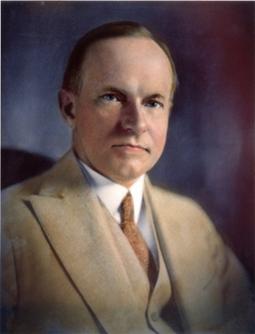
9 minute read
BAV BAVUAL UAL
Ulysses S. (born Hiram Ulysses) Grant of Ohio 18th President, 1869-1877
THE RECORD: The Union general who won the Civil War was rewarded with the presidency in 1868. While he is not generally considered a great overall president, black Americans made their greatest strides in his two terms than at any point until the FDR years. He signed laws that gave equal rights to blacks, allowed them to serve on juries and hold office, in Washington, D.C., and gave foreign-born blacks citizenship. Grant instituted Reconstruction in the South backed by U.S. Army troops, which gave blacks unprecedented political power, and outlawed the nascent Ku Klux Klan. Unfortunately, some of the black “carpetbaggers” who moved to the South to take advantage of the political opportunities tended to be corrupt.
Advertisement
12
Theodore Roosevelt of New York 26th President, 1901-1909
THE RECORD: Teddy Roosevelt, only the third vice president to succeed an assassinated president, epitomized America at the dawn of the 20th century: youthful, energetic, idealistic, full of ambition. He was unusually open-minded for his era, and that extended to matters of race. During the SpanishAmerican War, Roosevelt recruited black “Buffalo Soldiers” to serve in his Rough Riders regiment. White Southerners berated him for inviting Booker T. Washington to the White House for a consultation, the first time a black man had been given such an honor. On the other hand, the Brownsville Incident of 1906, wherein a dozen black Army soldiers were wrongfully accused of a shooting based solely on racial prejudice and were dishonorably discharged, thus ruining their lives, represented a low point in race relations.
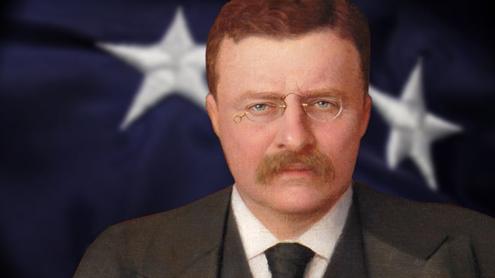
13
Thomas Jefferson of Virginia 3rd President, 1801-1809

THE RECORD: Yes, Jefferson owned slaves and impregnated one of them, Sally Hemings; however, it was the Declaration of Independence that introduced the concepts of democracy and human rights in the U.S. without which Africans in America could not rise. He was a white supremacist who wanted blacks sent back to Africa after a period of education, but he failed twice in getting slavery banned, first in the Declaration and then in the Constitution—where he nearly succeeded. As president, Jefferson did ban the importation of enslaved Africans but would not recognize Haiti’s independence in 1804, thinking it would encourage enslaved Southern blacks to revolt or emigrate there.

George Washington of Virginia
1st President, 1789-1797

THE RECORD: The Father of His Country started it all by defeating the British monarchy, head of the largest empire in human history, and setting up what would become the world’s first and longest continuing democratic republic. Like almost all of the Founding Fathers, Washington owned slaves (whom he freed in his will) and believed in the then-prevailing white supremacy worldview. As president, he endorsed the Fugitive Slave Act of 1793, which allowed bounty hunters to recapture escaped slaves, and sought to put down slave revolts abroad, while at the same time expecting slavery to die out naturally—that is, until Eli Whitney invented the cotton gin during his administration, making slave labor more popular and profitable than ever.

15
James Madison of Virginia

4th President, 1809-1817
THE RECORD: The Virginia slave owner had a mixed record on the issue of slavery. The Three-Fifths Compromise in the Constitution, wherein enslaved blacks were considered only three-fifths human for political purposes, was his idea. He expected the slave trade, and slavery itself, to die out over a generation or two as America expanded westward and helped set up the colonization of Liberia by American ex-slaves after his presidency.
16
John Quincy Adams of Massachusetts 6th President, 1825-1829
THE RECORD: The son of former President John Adams was unique for his time in that he vigorously opposed slavery before he became president and for many years after, especially when he served in the House of Representatives, although he did not call himself an abolitionist. Many Southerners considered him a leading pre-Civil War voice against slavery. The Amistad incident, where he defended Africans escaping a slave ship for their freedom in court, made him a celebrity for the cause.

George Herbert Walker Bush of Texas 41st President, 1989-1993
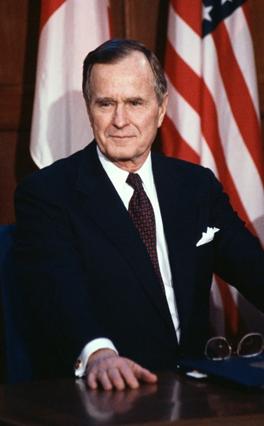
THE RECORD: “Poppy” Bush, the Connecticut Yankee who made his career in Texas politics, had a mixed civil rights record. Although he had been personally supportive of black friends and causes, he opposed the Civil Rights Act of 1964 and won the presidency in 1988 in part on racist Willie Horton ads. However, as a congressman, he voted for the Fair Housing Act of 1968, upsetting Republican conservatives, and was instrumental in the rise of both Colin Powell and, dubiously, Clarence Thomas. Continuing Reagan’s failed drug war only served to needlessly increase the incarceration rate and vilification of young black males.

18
George Walker Bush of Texas 43rd President, 2001-2009

THE RECORD: The self-styled “compassionate conservative” and son of Bush 41 garnered black support during his two successful runs for Texas governor; however, W failed to make much headway when he won the presidency twice, in 2000 and 2004, despite having appointed two African Americans to head the State Department: Colin Powell and Condoleezza Rice. Bush’s attempt to privatize Social Security and Medicare, two mainstays for blacks; his dismal response to Hurricane Katrina; and his failure to curb banking excesses that led to a housing crash and a Great Recession severely harmed black Americans. Further, black veterans did not significantly benefit from service in either Iraq or Afghanistan.
19
Gerald Rudolph Ford of Michigan 38th President, 1974-1977
THE RECORD: Jerry Ford, the only president in U.S. history never to be elected—he ascended to the office as an appointed vice president upon Nixon’s resignation over the Watergate scandal—didn’t do much in his career to further race relations. He gave tepid lip service to civil rights issues as a Republican congressman; appointed a token, William T. Coleman, as the first black transportation secretary; and then ironically came out against the hot-button school busing issue, which may have cost him the 1976 election.

Ronald Wilson Reagan of California 40th President, 1981-1989
THE RECORD: The Gipper, a former Hollywood matinee idol and liberal Democrat-turned-conservative Republican, began a revolution in government that altered its relationship with African Americans, largely for the worse. He inherited Barry Goldwater’s far-right political movement and made it acceptable to mainstream America, making veiled appeals to racists during the 1980 campaign. His administration’s formula of tax cuts for the rich, cuts to vital social services, and demonization of minorities and the poor has been replicated by GOP politicians ever since, sadly with much electoral success. Reagan is infamous for appointing “Silent Sam” Pierce to his Cabinet as HUD secretary; he once mistook Pierce for a big-city mayor during a meeting. A rare accomplishment was signing the bill to create Martin Luther King Jr. Day in 1983. Although Reagan was careful to hide his contempt for blacks, it was exposed in taped phone calls to Nixon many years after their deaths.

21

Chester Alan Arthur of New York 21st President, 1881-1885

THE RECORD: Arthur, a New York politician, lucked into the presidency after President Garfield was assassinated. The widower with expensive tastes has an enduring claim to gratitude from African Americans; during his administration, the U.S. Civil Service, a longtime chief employer of blacks, was formed.
22
Herbert Hoover of California 31st President, 1929-1933
THE RECORD: Hoover, a self-made millionaire came to the presidency with a reputation as a great humanitarian who had saved millions of World War I refugees from starvation. However, as president, he showed little evident concern for working Americans, including blacks, as the stock market crash and ensuing Great Depression wiped out many of his fellow Americans. For the first time, black voters en masse turned their backs on the Republican party in the 1932 election.

William Howard Taft of Ohio 27th President, 1909-1913

THE RECORD: The portly Taft had little patience for issues affecting black Americans and even discouraged Southern governments from hiring blacks. He subscribed to the prevailing belief among many whites that blacks were illequipped to vote. Taft preferred the approach of Booker T. Washington that encouraged blacks to pursue vocational work rather than intellectual pursuits, as W.E.B. Du Bois had advocated. During his single term in office, the National Association for the Advancement of Colored People (NAACP) was founded.
24 William McKinley of Ohio 25th President, 1897-1901

THE RECORD: The last president elected in the 19th century and the first to be assassinated in the 20th century, McKinley was raised to be an abolitionist by his mother and was fully in favor of equal rights for blacks. However, despite having appointed several blacks to valued postal positions in the South—very controversial in its day—and relaxing rules for service of black Buffalo Soldiers in the Spanish-American War, there was little more that President McKinley could do given the atmosphere of Jim Crow.
25 James Abram Garfield of Ohio 20th President, 1881
THE RECORD: President Garfield’s term was tragically cut short by an assassin’s bullet six months after his inauguration, but before his life ended, he had already established himself as a leading proponent of full citizenship rights for black Americans and proposed a plan for their advancement through universal education.


Warren
26
Gamaliel Harding of Ohio
29th President, 1921-1923
THE RECORD: Harding was the first 20th century president to openly advocate for political, educational and economic equality for African Americans. His proposal to form an international commission to improve race relations was shot down by Southern Democrats, and the Senate defeated an anti-lynching bill that he endorsed.

27 Benjamin Harrison of Indiana
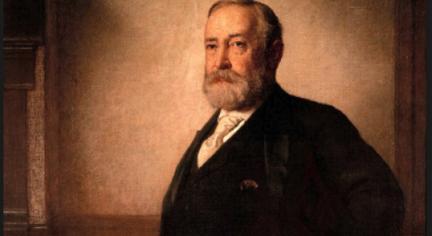
23rd
President, 1889-1893
THE RECORD: As a Republican, Harrison, the grandson of President William Henry Harrison, was progressive when it came to advancing the rights of black Americans. He was the first president to offer (failed) legislation to strengthen the 15th Amendment guaranteeing blacks the right to vote but which was all but ignored in the South, and he spoke out against lynching. Attitudes of the era prevented him from making any headway.
John
28
Adams of Massachusetts

2nd President, 1797-1801
THE RECORD: Adams, who never owned slaves (but did employ servants), despised slavery and thought it would eventually lead to the young nation’s ruin, yet he opposed abolition, believing that slavery should die a slow and natural death. His son, John Quincy Adams, would take a far more radical stance on eradicating slavery.

(Stephen) Grover Cleveland of New York 22nd and 24th President, 1885-1889 & 1893-1897

THE RECORD: The advancement of African Americans was neither a priority nor an afterthought for the only president elected to two nonconsecutive terms; he seemed not to care one way or the other. He considered Reconstruction to be a failure and refused to use federal power to enforce the 15th Amendment of the U.S. Constitution, which guaranteed voting rights to African Americans. Cleveland did not appoint any African Americans to patronage jobs, but he did allow Frederick Douglass to continue in his post as recorder of deeds in Washington, D.C. When Douglass later resigned, Cleveland appointed another African American man to replace him.

30
Martin Van Buren of New York 8th President, 1837-1841

THE RECORD: Jackson’s vice president saw abolition as the greatest threat to America’s existence and opposed interfering with slavery where it already existed. The Amistad slave ship revolt occurred during his administration. Van Buren appealed the ensuing court case, wherein the slaves won their freedom, all the way to the Supreme Court (he lost). The court case was a major catalyst along the journey to abolish slavery and elevate the status of blacks before the public.
31
William Henry Harrison of Ohio 9th President, 1841
THE RECORD: Harrison, scion of a Virginia slave-owning family, had been pro-slavery as governor of Indiana. He died of pneumonia only 30 days after his inauguration, too soon to establish a policy on slavery, though one suspects he would have sided with the South on the issue.

11thPresident,1845-1849
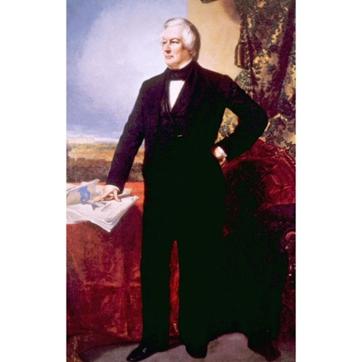
THERECORD: AsaTennesseeplanter,Polk ownedslaves, mainly children,andprofitedhandsomely from theirlabor Hetook slaveswithhim whenhewenttotheWhiteHouse yetkepthisslave-owning asecretfrom thepublicforfearof anoutcry from abolitionists PresidentPolk hadnoproblem withslavery expanding tothenewWesternterritories;itwas aneasy moneymaker

33
James Buchanan of Pennsylvania 15th President, 1857-1861

THE RECORD: The state of black Americans couldn’t have been much worse than under Buchanan’s administration. The Supreme Court’s Dred Scott decision upheld the right of Africans to be considered property by Southern whites, Kansas erupted into violence over the question of whether it was to be admitted as a slave or a free state, and national tensions finally led to secession of the Southern states into a new illegal country, the CSA. Buchanan was powerless to stop any of it nor was he inclined to do so.

34 Millard Fillmore of New York 13th President, 1850-1853
THE RECORD: Fillmore, an anti-slavery Northerner, was placed on the Whig party ticket to appease abolitionists, and when he became president after Taylor’s sudden death, he worked for passage of the Compromise of 1850, which admitted California to the Union but nearly tore apart the U.S. 10 years before the fact and ended Fillmore’s political career.
FranklinPierceofNewHampshire 14thPresident,1853-1857

THERECORD:Pierce,aNewHampshirite(andancestorof futureFirstLadyBarbaraPierceBush),wasoneofthefew NorthernerstosupportSouthernslavery Hissupportof suchduringthecongressionalsquabbleovertheKansasNebraskaAct,whicheruptedinto“BleedingKansas” awar betweenpro-andanti-slaverysupporters ledtothe creationoftheRepublicanPartyin1854andputanendto Pierce’spresidencyafteronetermin1856
36 James Monroe of Virginia 5th President, 1817-1825

THE RECORD: Monroe profited handsomely from his ownership of slaves over his lifetime—he owned approximately 70—and brought some of them with him to the White House. He signed the Missouri Compromise, which admitted Missouri as a slave state and Maine as a free state. A proponent of recolonization of slaves back to Africa, Monrovia, the capital of the African slave colony Liberia, was named for him.

37 Calvin Coolidge of Massachusetts 30th President, 1923-1929
THE RECORD: Under Silent Cal Coolidge’s hands-off administration, the Ku Klux Klan became a powerful national political force in both the Democratic and Republican parties throughout the 1920s, and their frequent Southern lynchings were a national disgrace.
